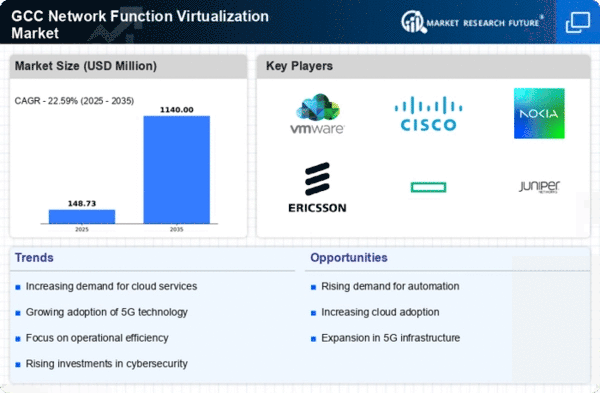Emergence of Managed Services
The emergence of managed services in the GCC is reshaping the landscape of the network function-virtualization market. As organizations seek to offload complex network management tasks, the demand for managed service providers is increasing. These providers offer expertise in deploying and managing virtualized network functions, allowing businesses to focus on their core operations. This trend is particularly beneficial for small and medium-sized enterprises that may lack the resources to manage complex network environments independently. The growth of managed services is likely to drive further adoption of network function-virtualization solutions, enhancing overall market dynamics.
Expansion of 5G Infrastructure
The rollout of 5G infrastructure across the GCC is significantly influencing the network function-virtualization market. With the anticipated increase in mobile data traffic, estimated to reach 100 exabytes per month by 2025, the demand for efficient network management solutions is escalating. Network function virtualization plays a critical role in enabling operators to manage this increased load effectively. By virtualizing network functions, telecom providers can enhance service delivery and optimize network performance, which is essential for supporting the high-speed connectivity that 5G promises. This expansion is likely to drive substantial investments in the network function-virtualization market.
Growing Need for Network Agility
In the GCC, the network function-virtualization market is propelled by the growing need for network agility. As businesses face rapidly changing market conditions, the ability to quickly adapt network services becomes crucial. Virtualization allows for the dynamic allocation of resources, enabling organizations to respond to customer demands and market shifts with greater speed. This agility is essential for maintaining competitive advantage, particularly in sectors such as finance and e-commerce, where responsiveness is key. The market is projected to grow as companies increasingly recognize the value of agile network solutions in enhancing their operational capabilities.
Rising Demand for Cost Efficiency
The network function-virtualization market is experiencing a notable surge in demand for cost efficiency among enterprises in the GCC. Organizations are increasingly seeking to reduce operational expenses while maintaining high service quality. By leveraging virtualization technologies, companies can optimize resource utilization, leading to potential savings of up to 30% in operational costs. This trend is particularly pronounced in sectors such as telecommunications and IT services, where the need for scalable and flexible solutions is paramount. As businesses continue to prioritize cost-effective strategies, The network function-virtualization market is likely to expand. This expansion is driven by the desire to streamline operations and enhance profitability..
Increased Focus on Digital Transformation
The ongoing digital transformation initiatives across various sectors in the GCC are acting as a catalyst for the network function-virtualization market. Organizations are increasingly adopting digital technologies to enhance operational efficiency and customer engagement. This shift necessitates the implementation of flexible and scalable network solutions, which virtualization provides. As businesses strive to integrate advanced technologies such as AI and IoT into their operations, the demand for network function-virtualization solutions is expected to rise. This trend indicates a robust growth trajectory for the market as companies seek to modernize their infrastructure.
















